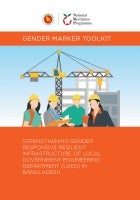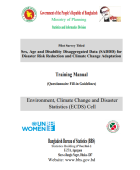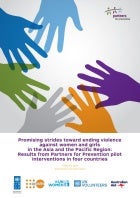1 - 20 of 31 Results
Pagination
Date:
Heading into 2025, we are about to commemorate the thirtieth anniversary of the Beijing Declaration and Platform for Action (Beijing+30). Adopted by 189 countries at the Fourth World Conference on Women in 1995, it is one of the most comprehensive blueprints for gender equality and women’s empowerment ever created.
Date:
A photobook of 13 stories capturing the journey to recovery of vulnerable women in Ho Chi Minh City and Tien Giang province who have faced and overcome challenges posed by COVID-19.
Date:
Brochure introducing and summarizing of the impacts of a DFAT-funded project “COVID-19 Emergency Response and Recovery Support for Women at Risk of Violence”. The project helped vulnerable women in Ho Chi Minh City and Tien Giang province recover their livelihoods and was implemented from 2022 to 2024 by UN Women Viet Nam and the Tien Giang & Ho Chi Minh Women’s Union.
Date:
This brief explains key concepts related to gender-transformative approaches, accompanied by examples to support organizations in Myanmar to apply them more confidently in their Women, Peace, and Security (WPS) programming.
Date:
FYLP follows a ground-up approach to understanding, operationalising, and building resources for feminist youth leadership in India, while simultaneously unpacking the context in which these are embedded. The Workbook is one of the Knowledge Products from the programme.
Date:
Through this project, they took on the task of advancing the Generation Equality Forum mandate by creating a contextual programme around building feminist youth leadership in India. FYLP follows a ground-up approach to understanding, operationalising, and building resources for feminist youth leadership in India.
Date:
The handbook is primarily for service providers working with women and queer persons who have survived or are experiencing domestic violence and was conceived as a resource that might help plug the gap and allow various service providers to adapt existing services and modes of approach to addressing the needs of survivors of domestic violence sensitively.
Date:
This handbook serves as a resource for survivors of domestic violence to understand their legal rights and provides clarity on relevant legal aspects. It also serves as a valuable resource for professionals such as lawyers, social workers, law enforcement.
Date:
UN Women in partnership with the International Foundation for Crime Prevention and Victim Care (PCVC) developed a comprehensive resource providing district-wise details of services available throughout the state. It is primarily aimed at aiding survivors and their families in seeking essential support.
Date:
Compendium of stories on women-led development in the Aspirational Districts of India. The book includes a story series from multiple States of India on women’s achievements in education, entrepreneurship, and grassroots leadership.
Date:
The survey, conducted over the phone with interviews lasting approximately 20 minutes, involved 3,000 respondents. It comprised questions on household finances, employment and livelihoods, safety and security, access to basic services, including health and education.
Date:
The Gender Marker Toolkit, under the National Resilience Program (NRP), has been designed to strengthen and develop the gender work of the Local Government Engineering Department (LGED) which already has a Gender Equity Strategy and Action Plan and an active Gender Forum. The Toolkit aims to raise awareness, understanding, and skills in ensuring gender responsiveness throughout all project stages and for all asset types that the Bangladesh Local Government Engineering Department (LGED) works on. It also aims to strengthen LGED’s influencer role with other Ministries and Departments.
Date:
This 10-year implementation of the National Target Programme on New Rural Development has resulted in significant improvements in the socio-economic development of rural Vietnam. By the end of 2020, 62.4 per cent of rural communes met the New Rural Development standard; the average attainment of the NRD criteria was 16.4 out of a total of 19 criteria. Despite such remarkable improvements, there are still sizable gender gaps in terms of employment, property ownership, and access to public services in rural areas, especially in poor districts and communes. The burden of unpaid care work hinders equal access for women to opportunities; gender-based violence remains high at places.
Date:
The two National Target Programs on New Rural Development and Sustainable Poverty Reduction for the period 2016-2020 have achieved important results. There have been more than 6 million people escaping poverty, approximately 2 million people escaping near poverty; 62.4 per cent of communes met the New Rural Development standard. However, there are still sizable gender gaps in terms of employment, property ownership, and access to public services in rural areas, especially in poor districts.
Date:
This enumerator’s training manual was developed by the Bangladesh Bureau of Statistics (BBS), the implementation partner of the EmPower project in Bangladesh for SADDD collection, to support the rollout of the survey.
Date:
UN Women and IOM in Cox’s Bazar partnered to conduct this research which presents a critical exploration of gendered social norms among the Rohingya community in Cox’s Bazar and concludes with key reflections and guiding questions for practitioners working in response interventions in Cox’s Bazar to improve programmes with respect to sensitivity surrounding social norms.
Date:
This report provides insights for donors, policymakers, programme managers, and practitioners into the development, implementation, and evaluation of primary prevention interventions designed to prevent violence against women and girls (VAWG).
Date:
This study set out to map, document and understand the relative vulnerability of municipal markets and their vendors, farmers and wider communities to climate change risks. The outcomes are practical measures and policy recommendations that can be implemented by UN Women’s Markets for Change project, municipalities and other relevant stakeholders to reduce this vulnerability and to prepare for disasters.
Date:
This study set out to map, document and understand the relative vulnerability of municipal markets and their vendors, farmers and wider communities to climate change risks. The outcomes are practical measures and policy recommendations that can be implemented by UN Women’s Markets for Change project, municipalities and other relevant stakeholders to reduce this vulnerability and to prepare for disasters.
Date:
This study set out to map, document and understand the relative vulnerability of municipal markets and their vendors, farmers and wider communities to climate change risks. The outcomes are practical measures and policy recommendations that can be implemented by UN Women’s Markets for Change project, municipalities and other relevant stakeholders to reduce this vulnerability and to prepare for disasters.

![[cover]](/sites/default/files/styles/search_image_140px/public/2025-03/cn-c1515-en_unwomenchina-newsletter2024-960px.jpg?itok=5te-4pFb)
![[cover]](/sites/default/files/styles/search_image_140px/public/2024-06/vn-c927-photobook-h-960px.jpg?itok=bpqxfWhH)
![[cover]](/sites/default/files/styles/search_image_140px/public/2024-06/vn-c926-covid-emergency-response-brochure-eng-960px.jpg?itok=5tvPiy4u)
![[cover]](/sites/default/files/styles/search_image_140px/public/2024-04/mn-c825-myanmar-wps-brief2-cover-960px.jpg?itok=g1-XuFHP)
![[cover]](/sites/default/files/styles/search_image_140px/public/2024-04/in-c772-workbook_fylp-960px.jpg?itok=QdyrqHgZ)
![[cover]](/sites/default/files/styles/search_image_140px/public/2024-04/in-c771-resource-toolkit_fylp-960px.jpg?itok=GbxQmzxj)
![[cover]](/sites/default/files/styles/search_image_140px/public/2023-10/in-psycho-social-handbook-pcvc-960px.jpg?itok=UH5zodCV)
![[cover]](/sites/default/files/styles/search_image_140px/public/2023-10/in-legal-handbook-pcvc-en-960px.jpg?itok=Ya92tXYv)
![[cover]](/sites/default/files/styles/search_image_140px/public/2023-10/in-survivor-support-services-directory-960px.jpg?itok=8cC9FacG)
![[cover]](/sites/default/files/styles/search_image_140px/public/2023-07/in-leading-from-the-front_20june23-960px.jpg?itok=2uLfLiWZ)
![[cover]](/sites/default/files/styles/search_image_140px/public/2023-06/ap-Helping-communities-weather-the-socioeconomic-960px.jpg?itok=epAc_pVT)

![[Final Report] An Independent Gender Review and Impact Assessment of the National Target Programme on New Rural Development for the period of 2010-2020](/sites/default/files/styles/search_image_140px/public/Field%20Office%20ESEAsia/Images/2021/12/vn-Final-Report-ENG-1679px.jpg?itok=y2YVZy4p)
![[cover]](/sites/default/files/styles/search_image_140px/public/Field%20Office%20ESEAsia/Images/2021/12/vn-PROMOTING-GENDER-MAINSTREAMING-ENG-1679px.jpg?itok=tAwwt8JZ)





